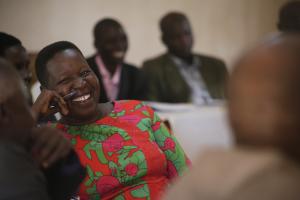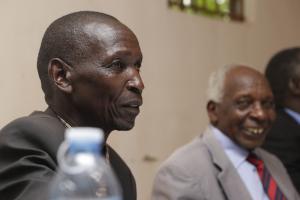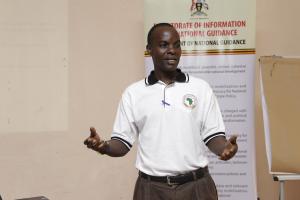Event reports
At the very beginning of the workshop, John Oyambi, starts with an urgent request to all participants. “Let your title outside this room” he tells the attendees. Only if all the leaders start working together there can be progress in and for Uganda and it starts at the district level. To involve every option, every meaning and every view is the beginning point for a better future, he concludes. But if everybody would only look into his party card and his position, progress could not happen; John Oyambi finishes his opening remarks.
The workshop was split in two main parts. First Dr. Mutto starts with a presentation on a theoretically basis. The second part involves the participants and linked the theory with the experience, the knowledge of the leaders. This dichotomy should enable the participants to reflect on their behavior and to find new ways for running their leading positions in the future.
He stars asking the question, how civic education can impact the process of nation building. To address the appointed and elected leaders the people needs to understand the political system, in the Ugandan case the multiparty system, to take them accountable. This broader concept includes the teaching of civil knowledge, civic values and civic skills. If the people don't understand the running concepts the multiparty system cannot work effectively. “Civic education is the key to the attainment of liberty and equality” he concludes.
Dr. Mutto continues with the most important question: What is a multiparty democracy and what means service delivery in such an environment? Democratic progress needs open and competitive conditions and acceptance of the democratic rules by all players. Multiparty system means multi-opinions and multi-ways to face problems. Parties needs to work together otherwise they fail their responsibility on service delivery. He reminds the participants to keep that in mind when starting to work together in the breakout sessions.
This kind of work-session takes the second and biggest space of the workshop. The participants therefore were split in two groups. One group brought together the appointed and the other the elected leaders. Both groups get the task to figures out challenges and problems in their daily working life as appointed or elected leaders. After that the participants in their groups should look for solutions and ways to fix those problems in the future. The appointed leaders especially filter out the poor working conditions and the existing communication gap between themselves and the elected leaders. Furthermore the work with the different stakeholders should be improved. To address the bad working conditions the group concludes that there is a need of good policy and budget implementation and a better mobilization of the given resources. A better coordination, monitoring, evaluation and mobilization of local partners could help to manage the communication problem and dragging work with the stakeholders.
The behavior of the appointed leaders was addressed as biggest challenge for the group of elected leaders. Things like under looking them, don’t respect their work and opinions, the high taxes for elected compared to the appointed leaders and the information gap, due to the not-willingness of the appointed leaders to share them with the elected leaders, were pointed. To improve their positions in the public and out of it improving their standing towards the appointed leaders meetings with the public, like town hall meetings, could be an solution for their occur representation. Furthermore a better communication between the appointed and elected leaders is need, so the group.
Dr.Mutto summarizes all the given input in his closing remarks. The participants had exactly pointed all that things, the conference wants to show. Not the multiparty system is the problem. How the leaders deal with it is the problem. Both groups had criticized the behaviors of the other group. The joint elaboration in the groups and the presentation toward the other group enable all participants to reflect their own behavior and out of it their impact for the dysfunctional system. The conference doesn’t want to implement solutions. The aim was to enable the participants to reflect. And that happened, Dr. Mutto concludes and closed the conference satisfied.







